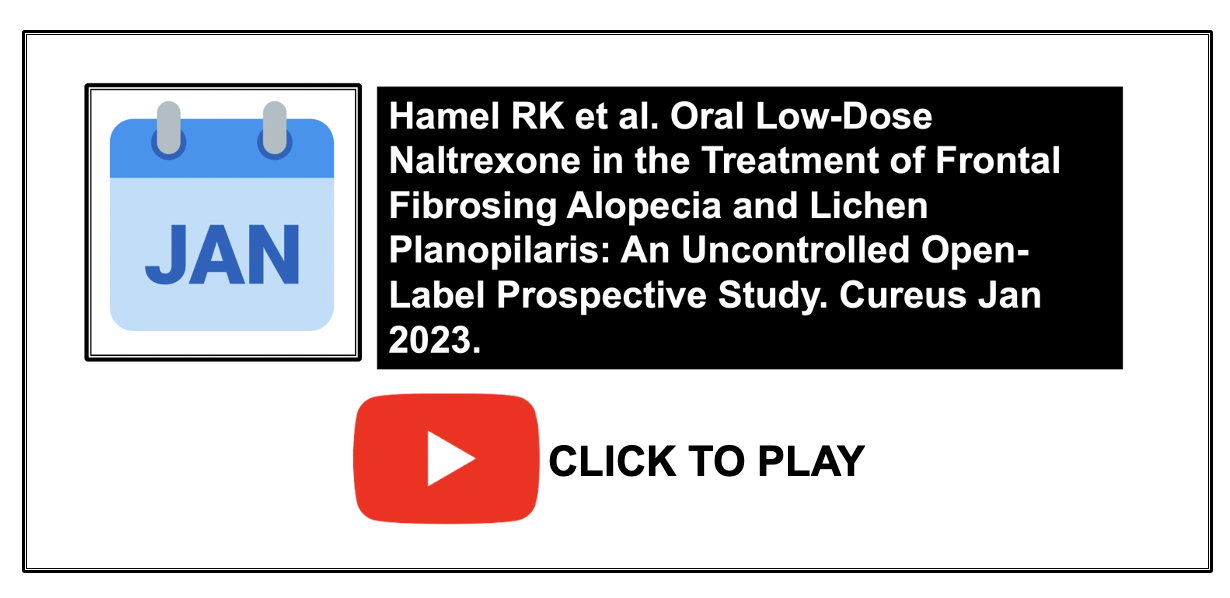LDN in Treating FFA and LPP: Main Effects are on Redness
LDN Reduces Long Scalp Redness with Less effects on other Parameters
A wew study sought to investigate the potential benefits of LDN for treating lichen planopilaris and frontal fibrosing alopecia. Two prior studies, including a 2017 study by Strazulla and colleagues and a 2020 study by Lajevardi and colleagues had different results. The 2017 study suggested some benefits of LDN to reduce infammation and itching. The 2020 placebo controlled study study suggested no benefit.
Here, adults over 18 years of age were recruited from patients seen at Washington University Dermatology clinics with clinically or histologically confirmed diagnoses of LPP or FFA .
Subjects were seen by a dermatologist at baseline and 3, 6, and 12 months. The same investigator assessed the clinical response to treatment at all visits.
At each office visit, data were collected as outlined on the patient assessment form including patient-reported assessments of scalp itching and burning/pain, as well as physical assessments of erythema, scale, and area of scalp involved. Possible adverse effects were recorded at each visit as well as any additional concurrent treatments for FFA or LPP being used.
Patients were allowed to continue their other treatments for LPP and FFA during the study period, but no new treatments were added by the dermatologist.
Results
Between September 1 and December 31, 2019, a total of 43 patients were enrolled to start 3 mg daily oral low-dose naltrexone. The study concluded on December 31, 2020. 26/43 (60%) of patients took naltrexone for the full 12 months and completed at least the initial and two follow-up assessments.
Mean age of patients in this study 65 years. 95 % white. 81.4 % had FFA. 14 % LPP and had 4.7 % had both LPP and FFA.
When severity of itching, burning and scaling was compared at 12 months to that of baseline there was found to be no statistically significant difference with the use of LDN. However, there was a different in scores for redness at baseline and 12 months. Redness reduced by one point on a three point scale.
The authors noted that the frontal hairline was stable in FFA patients during the study period.
Even though itching, burning, and scaling were not different at the 12 months mark, there did appear to be a benefit of LDN for a few months before losing effects. For example, there was an improvement in scores for burning at the 6 month mark and for scaling at the 3 and 6 month mark before these effects were not apparent anymore.
Side effects were noted in 41 % of patients and included vivid dreams in 21 % (most common side effect) and headaches in 9 %.
Discussion
This is an interesting study which suggests that LDN could potentially have a role in the management of LPP and/or FFA. It was a small study, so it’s not possible to really separate data according to FFA and LPP.
It was an uncontrolled study so there was no control group to compare side effects. Furthermore, we don’t truly know if these are effects that are attributable to LDN. We also don’t know if treatments patients were on leading into the study were responsible for the stability of the hairline. But nevertheless, it appears LDN impacts redness and we know that redness is a sign of disease activity.
More studies are needed, especially with a control. It is possible that a drug can reduce redness without halting the disease so this really needs to be ascertained with further study.
In addition, photographs may be a more valuable way to determining if the frontal hairline is being affected than measurements from the eyebrow area to the hairline. In some cases there measurements are fairly stable even though FFA is affecting the hairline in other areas of removing eyebrows or removing body hair.
REFERENCE
Hamel RK et al. Oral Low-Dose Naltrexone in the Treatment of Frontal Fibrosing Alopecia and Lichen Planopilaris: An Uncontrolled Open-Label Prospective Study. Cureus Jan 2023.
This article was written by Dr. Jeff Donovan, a Canadian and US board certified dermatologist specializing exclusively in hair loss.

